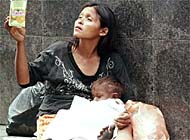
Opponents of globalisation use UN summit to air grievances

As the United Nations gears up for a special summit on social development, opponents of globalisation are holding an alternative meeting in Geneva to try to develop a more cohesive strategy to combat trade liberalisation.
After a series of workshops on Thursday and Friday, at least 700 delegates from all over the world – from landless Brazilian peasants to South Korean trade unionists – will hold a plenary session in the University Mail building on Saturday, followed by a march to the United Nations on Sunday.
“The main purpose of the summit is to come up with a text outlining the points on which we agree, and the points we still have to discuss – a kind of state of play of the global social movement,” says Erik Grobet, one of the organisers of the alternative summit.
Grobet is a leading member of the Swiss branch of the Bangkok Appeal, which incorporates a wide range of non-governmental groups with one common aim – fighting corporate globalism. These were the groups that brought Seattle to a standstill last November when the city hosted the World Trade Organisation summit.
Last February, they met again on the fringes of the UN Trade and Development summit in Bangkok, where they issued an appeal to civil society to mobilise against globalisation.
It was at that gathering that they decided to weld themselves into a more cohesive structure. They also agreed to meet wherever and whenever the world’s leaders gathered. In September, they will hold another alternative summit in Prague to coincide with the annual meeting of the International Monetary Fund.
The Bangkok Appeal is lobbying for several key changes to the global financial system, including the cancellation of Third World debt, an end to IMF structural adjustment programmes, a moratorium on any negotiations that would increase the power of the World Trade Organisation, and the introduction of a tax on capital flows.
The UN General Assembly, which begins meeting on Monday, will assess how much progress has been made in attaining the goals set at a UN Social Summit in Copenhagen five years ago. The central theme is how to achieve social development during globalisation, and many participants will be pushing for international financial institutions and multinationals to become more socially responsible.
Erik Grobet is not optimistic that the UN session will achieve much. “If you look at what they put on paper in Copenhagen, [it’s clear] they’ve achieved almost nothing. I don’t believe Geneva will change a great deal.”
Grobet believes social movements are more likely to bring about change, provided they can work together. “If the international social movement grows stronger, we can put real pressure on governments, and in this way we will be able to change something.”
The Bangkok Appeal’s insistence on holding an alternative summit has prompted concerns that there could be a repeat of the street battles in Seattle. But Grobet is confident that the summit, and a protest march to the UN headquarters, will pass off peacefully.
“We’re definitely not expecting violence. It is not a protest against the United Nations. In Seattle, they tried to block the WTO meeting. In Geneva, we won’t be trying to do that. I’m confident it will be peaceful.”
The alternative summit has also caused controversy on a local level. Geneva city and canton are paying SFr120,000 towards the costs of the gathering, mainly for transporting delegates from developing countries.
However, the decision to fund the meeting has been lambasted by Switzerland’s permanent representative to the United Nations in Geneva, François Nordman.
“Geneva fought hard to get the WTO headquarters. The Geneva taxpayer is contributing to the establishment of this organisation. Now there is a campaign in Geneva against the WTO. It’s a perverse climate. I think we’re getting a little schizophrenic,” Nordman told swissinfo.
“I accept we need a dialogue on the role of the WTO, and we must include those groups that are most critical of it. But I don’t see why the taxpayer should fund protests, which will undermine the public policy of supporting the WTO presence in Geneva.”
Nordman’s view is not shared by the Geneva authorities. The mayor, Alain Vaissade, says that by helping to fund the alternative summit, the city is fostering dialogue and helping to avert violence.
“If protests happen, it will be because members of civil society haven’t been able to express themselves in the debate,” Vaissade says. “That’s why there were clashes at the WTO in Geneva in 1998 and in Seattle. It’s something we’ve been trying to address here in Geneva.”
by Roy Probert

In compliance with the JTI standards
More: SWI swissinfo.ch certified by the Journalism Trust Initiative


























You can find an overview of ongoing debates with our journalists here . Please join us!
If you want to start a conversation about a topic raised in this article or want to report factual errors, email us at english@swissinfo.ch.